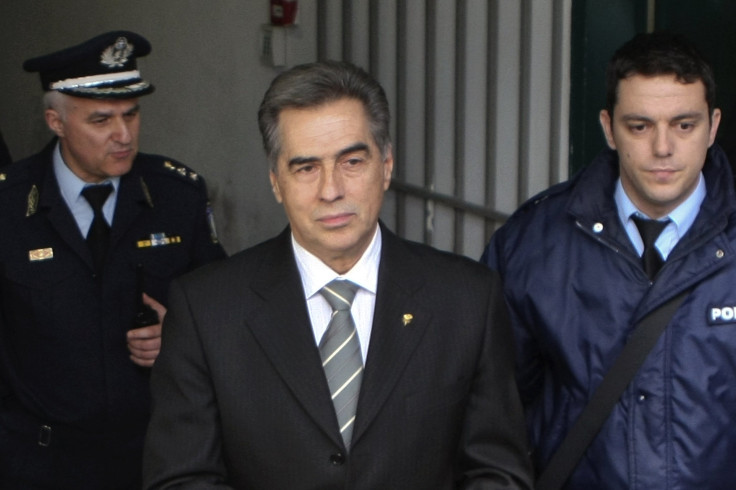Greek Politician Sentenced To Life Imprisonment For Embezzlement: Is Athens Really Cracking Down On Corruption?

A court in Greece has sentenced a prominent politician to a life sentence in prison for embezzlement after a nearly six-month trial, suggesting perhaps that authorities in the beleaguered, cash- strapped nation may finally crack down on government corruption.
The Ekathimerini newspaper of Athens reported that Vassilis Papageorgopoulos, the former mayor of Greece’s second-largest city, Thessaloniki, and two of his former aides, were convicted of stealing about 18 million euros ($23.5 million) from the municipal treasury.
The amount filched equaled about half of the city's entire public works budget, Reuters reported.
Papageorgopoulos was implicated in a conspiracy perpetrated by Michalis Lemousias and Panagiotis Saxonis, his general secretary and treasurer, respectively, during Papageorgopoulos’ two terms as mayor between January 1999 and December 2010.
Lemousias and Saxonis also received life terms (which also included conviction on charges of forgery and money laundering), with an additional nine years tacked onto Saxonis’ sentence for confessing to handling cash deals in his own office.
Specifically, BBC reported, the court was told that Saxonis siphoned contributions of council workers’ wages that were meant for the replenishment of social security funds. He allegedly took 10 percent of the cut and split the remainder with Lemoussias and Papageorgopoulos, who kept their illicit cash in a joint bank account.
This was the first big corruption trial in the country since Greece sank into a crippling debt crisis a few years ago.
BBC noted that the sentence was likely the harshest ever levied against a Greek lawmaker for corruption.
Ekathimerini described the extraordinary punishments as a “rare conviction that sent shock waves through the political and media establishments.”
Upon hearing the verdict in court, the disgraced former mayor commented: “I declare that I have nothing to do with this case. I am sure that some people will die with remorse.” In response, the presiding judge Giorgos Apostolakis quipped: “In any case, that won’t be us.”
Papageorgopoulos also insisted his conviction was motivated by politics, not the facts of the case.
The three convicts, who are expected to appeal, were immediately taken to Diavata Prison in Thessaloniki.
Two other former city officials received 15- and 10-year prison terms, respectively, while another 13 former municipal employees were acquitted of charges, Ekathimerini stated.
One of the prosecuting witnesses in the lengthy trial, Thessaloniki’s present mayor, Yiannis Boutaris, a left-leaning reformist, characterized city hall as running a kind of racketeering operation in which ‘omerta’ (silence) prevailed.
As a former junior minister and member of the conservative New Democracy (ND) party, which rules Greece through a fragile coalition, Papageorgopoulos’ conviction triggered outrage from the opposition SYRIZA leftist party.
SYRIZA officials blasted Prime Minister and ND leader Antonis Samaras for earlier describing Papageorgopoulos as “honorable” (although that compliment was uttered prior to the embezzlement case).
Corruption has long been deeply entrenched among Greece’s political elite, who have generally enjoyed immunity from prosecution. Last year, the anti-corruption watchdog campaigner Transparency International called Greece the most corrupt state in the European Union, even worse than such “luminaries” as Bulgaria and Romania.
"The results of the survey should be a warning signal for the EU to require more information and accountability from its member states," TI Director Jana Mittermaier told Reuters, referring specifically to Greece.
Indeed now, deep into an economic paralysis and lengthy recession accompanied by extraordinarily high unemployment and huge cuts in social spending, a fed-up Greek public may be demanding accountability from its mandarins.
In addition, the EU, the European Central Bank and International Monetary Fund – which together have dispatched hundreds of billions of euros to Greece – have pressured Athens to take a hard line against corrupt officials.
However, such prosecution has been slow or nonexistent.
The New York Times reported that last September, Greek authorities started to probe the financial records of more than 30 Greek politicians suspected of embezzlement, tax evasion and other acts of financial malfeasance, but none have yet yielded any criminal charges.
Costas Bakouris, the chair of Transparency International- Greece, wrote in the Guardian late last year that there is still hope for Greece, despite the widespread perception that wealthy citizens are not paying their fair share of taxes while the poor and middle class suffer.
“To a large extent, Greece's economic future depends not only on bailouts, but on how well it fights corruption,” he said. “Bribery, tax evasion and a host of other mistakes have contributed to the present crisis Greece faces, and threaten to block any economic route the country takes in the future -- default, bailout, austerity or stimulus.”
Yet, Bakouris thinks Greece can root out such misconduct, as Hong Kong once did in the 1970s.
“Corruption can be tackled,” he declared. “Greece's ombudsman, for example, is well equipped to combat corruption thanks to a clear mandate enshrined in law and a well-trained staff. … But the reforms must run deep.”
He also told the Guardian that Greece’s political structure must be overhauled.
"We need to create a political system where politicians care more about the fate of the country than themselves," he said.
"In short, we need to make politicians accountable."
© Copyright IBTimes 2025. All rights reserved.





















